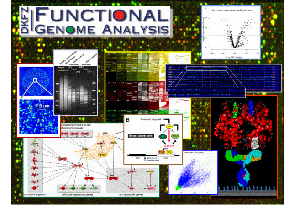Functional Genome Analysis

Research at the division focuses on the development and application of technologies for an assessment and description of the realisation and regulation of cellular function from genetic information. Analysis of tumour material is at the centre of attention, with an emphasis on pancreatic cancer and personalized approaches. The effects of DNA sequence variations and the epigenetic modulation of the genome are studied. This is combined with measurements on variations in transcription factor binding and changes in transcript levels of coding and noncoding RNAs. Concomitantly, the actual protein expression is analysed. We complement molecular analyses with functional studies for the elucidation of relevant cellular mechanisms.
Beside the creation of basic scientific knowledge, we aim at establishing means for early and non-invasive molecular diagnosis as a basis for accurate prognosis, reliable patient stratification, and a precise monitoring of treatment results. Another objective is the identification of new therapeutic approaches.
Technically, we pursue particularly developments in the field of proteome analysis. We have established affinity-based processes that permit a robustness and reproducibility that meet the requirements of clinical applications and are amendable to translation. Also, various auxiliary facets such as appropriate protocols for protein extraction from various sample types have been established. One scientific aim is the identification of disease-specific protein isoforms. Structural variation is often an indicator for different functional activity. Also, measurements of protein interactions are performed, in particular for the identification of variations that occur at a personal level. A third activity is the creation of a map of the protein-mediated communication between the different cell types of the pancreatic tumour microenvironment.
All the above forms the basis for functional analyses toward the definition of cellular mechanisms and the identification and evaluation of potential therapeutic avenues. Both targeted experiments are performed, such as detailing the effect of methylation variations in gene promoters on particular pathways, as well as global studies, for example genome-wide shRNA knock-down or CRISPR-Cas mediated knockout studies and related over-expression analyses. Functional consequences of observed molecular events are studied in detail in cell lines, xenograft mice and mouse models, or directly on patient samples.
Another line of work aims at the fully synthetic, in vitro implementation of complex biological processes. Motivation is their utilization in synthetic biology activities for the production of biomedically active molecules, such as non-immunogenic agents, and the establishment of an entirely artificial molecular system. Cell-free biosynthetic production will be crucial for mastering many biotechnological and pharmacochemical challenges. Artificial biological systems will complement Systems Biology by evaluating biological models experimentally. Similar to physics, insight into cellular function will be gained by an iterative process of performing experimental and theoretical Systems Biology. Eventually, this may lead to the establishment of a fully synthetic self-replicating system and, ultimately, an archetypical model of a cell.
Many projects are pursued in national and international collaborations and programmes. Apart from publications in scientific journals, the division filed a substantial number of patents / patent applications, of which several have been licensed out or are being utilised in ongoing collaborations with commercial partners. Also, companies have been spun-off, which pursue some of the results at a commercial level.






